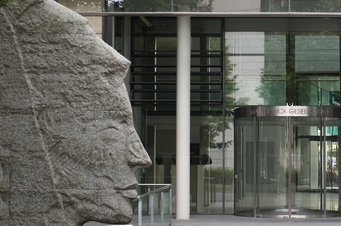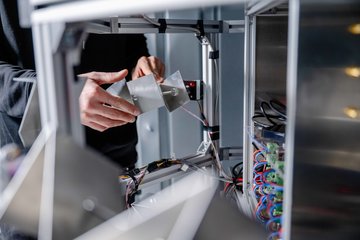Amazon and Max Planck Society establish Science Hub
The cooperation strengthens application-related research on artificial intelligence in Germany
Amazon and the Max Planck Society today announced the establishment of the first German Science Hub in Tübingen. The main goal of this science cooperation is to advance research in Germany in subfields of artificial intelligence (AI), in particular causality, computer vision and machine learning, to develop secure and trustworthy concepts for the future and thus to strengthen Germany as a technology location. Amazon is providing nearly 700,000 euros for this purpose in the first year. The cooperation is initially scheduled to run for five years.

The framework agreement between the two parties lays the foundation for simplified free research collaborations, reduces administrative hurdles and regulates intellectual property issues. It initially includes the four Max Planck Institutes for Intelligent Systems, for Software Systems, for Informatics and for Biological Cybernetics, and is open to other Max Planck Institutes.
As part of the cooperation, Amazon supports the financing and implementation of research projects as well as the education and training of talented doctoral students. In addition, scientists from the Max Planck Society are given the opportunity to work at Amazon in the form of a part-time job, thereby gaining deeper insights into application-related research that will benefit their academic work. The collaboration of interdisciplinary researchers from business and academia brings together diverse perspectives and practices that will drive innovation.
First projects on avatar generation and AI and causality
The first projects on which researchers from Amazon and the Max Planck Society are working together have already been planned: In a project by Amazon Fashion and the Max Planck Institute for Informatics in Saarbrücken, a digital 3D image of a person is to be created in order to quickly capture their size and body shape in different clothing. The challenge so far is to be able to distinguish the clothes from the body. This improves the virtual shopping experience, for example, and thus helps to avoid returns.
Six doctoral fellowships are in the area of causality, one of the fellowships for the project, “Merging Data Sources.” In this project, causality experts from Amazon Web Services (AWS) are collaborating with the Department of Empirical Inference at the Max Planck Institute for Intelligent Systems. The scientists involved want to investigate how new information can be obtained by linking different data sets. "Causal inference", i.e. AI methods that can distinguish between correlation and causality, should help to evaluate even incomplete data sets in a targeted manner in the future.
"The collaboration also promotes young research talent in particular, which will be needed for Germany as an AI location in the coming years and can be optimally trained at the Science Hub," says Max Planck President Martin Stratmann. "Because the Hub offers something that is particularly rare in Germany: The opportunity to research AI solutions in the real world on a large scale. And at the highest level, because with Amazon and the academic environment in Tübingen, there are real drivers of innovation in machine learning that are further deepening their collaboration here."
Michael J. Black, Director at the Max Planck Institute for Intelligent Systems, adds: "We are delighted that our Cyber Valley partner Amazon is significantly increasing its commitment to basic research in Tübingen and in the Max Planck Society as a whole. With its new research facility next to the Max Planck Campus, Amazon has built world-class research and development teams. The Science Hub builds on this and offers the opportunity for joint research, funded projects, student scholarships and internships. We look forward to new groundbreaking research emerging from this collaboration."
Software solutions as open source projects
Through collaboration, teams can work on joint publications and share their academic progress with the research community. In addition, there are joint research events and activities, such as symposia that are open to the public. Amazon also makes many software solutions available as open source projects.
"We want to create solutions to urgent challenges that benefit society. We are pleased to collaborate with the Max Planck Society, which is highly renowned in the field of AI, and to bring together the best talent of our two organizations to successfully develop AI further. This collaboration allows us to work with the local Max Planck Institutes at the established science hub of Tübingen to advance AI research in a way that is safe, responsible and fair, and that delivers sustainable benefits to society beyond industrial application and academic curiosity," says Yasser Jadidi, head of the Tübingen research team at Amazon Web Services (AWS).
His colleague Betty Mohler Tesch, scientist and head of a research team at Amazon Fashion, adds: "The collaboration offers young scientists insights into both basic research at the Max Planck Institutes and applied research at Amazon, for example, how computer vision technology might be leveraged to improve our Amazon Fashion customers’ shopping experiences. Core to the vision of the hub is the creation of open doors and the exchange of ideas through community events, open houses, and even just over coffee.”
The Science Hub is Amazon's first research collaboration of its kind outside the U.S. and underscores Amazon's commitment to collaborating with leading research institutions worldwide. Similar U.S. collaborations exist with the Massachusetts Institute of Technology (MIT), the University of Washington, the University of California (UCLA) and Columbia University (CAIT).












